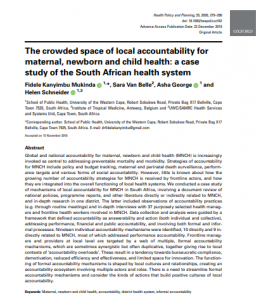
Global and national accountability for maternal, newborn and child health (MNCH) is increasingly invoked as central to addressing preventable mortality and morbidity. Strategies of accountability for MNCH include policy and budget tracking, maternal and perinatal death surveillance, performance targets and various forms of social accountability.
However, little is known about how the growing number of accountability strategies for MNCH is received by frontline actors, and how they are integrated into the overall functioning of local health systems. We conducted a case study of mechanisms of local accountability for MNCH in South Africa, involving a document review of national policies, programme reports, and other literature directly or indirectly related to MNCH, and in-depth research in one district.
The latter included observations of accountability practices (e.g. through routine meetings) and in-depth interviews with 37 purposely selected health managers and frontline health workers involved in MNCH. Data collection and analysis were guided by a framework that defined accountability as answerability and action (both individual and collective), addressing performance, financial and public accountability, and involving both formal and informal processes.
Nineteen individual accountability mechanisms were identified, 10 directly and 9 indirectly related to MNCH, most of which addressed performance accountability. Frontline managers and providers at local level are targeted by a web of multiple, formal accountability mechanisms, which are sometimes synergistic but often duplicative, together giving rise to local contexts of ‘accountability overloads’. These result in a tendency towards bureaucratic compliance, demotivation, reduced efficiency and effectiveness, and limited space for innovation.
The functioning of formal accountability mechanisms is shaped by local cultures and relationships, creating an accountability ecosystem involving multiple actors and roles. There is a need to streamline formal accountability mechanisms and consider the kinds of actions that build positive cultures of local accountability.